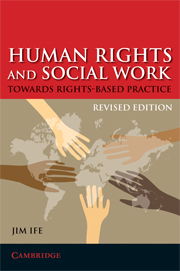Book contents
- Frontmatter
- Contents
- About the author
- Acknowledgments
- Introduction
- 1 Human Rights in a Globalised World
- 2 Human Rights: Beyond Traditional Formulations
- 3 Public and Private Human Rights
- 4 Culture and Human Rights
- 5 Human Rights and Human Needs
- 6 Human Rights and Obligations
- 7 Ethics and Human Rights
- 8 Participation in the Human Rights Discourse
- 9 Constructing Human Rights for Social Work Practice
- 10 Achieving Human Rights through Social Work Practice
- 11 Respecting Human Rights in Social Work Practice
- 12 Conclusion: Prospects for Human Rights Practice
- Appendix I The Universal Declaration of Human Rights
- Appendix II Other Human Rights Declarations, Treaties and Conventions
- References
- Index
9 - Constructing Human Rights for Social Work Practice
- Frontmatter
- Contents
- About the author
- Acknowledgments
- Introduction
- 1 Human Rights in a Globalised World
- 2 Human Rights: Beyond Traditional Formulations
- 3 Public and Private Human Rights
- 4 Culture and Human Rights
- 5 Human Rights and Human Needs
- 6 Human Rights and Obligations
- 7 Ethics and Human Rights
- 8 Participation in the Human Rights Discourse
- 9 Constructing Human Rights for Social Work Practice
- 10 Achieving Human Rights through Social Work Practice
- 11 Respecting Human Rights in Social Work Practice
- 12 Conclusion: Prospects for Human Rights Practice
- Appendix I The Universal Declaration of Human Rights
- Appendix II Other Human Rights Declarations, Treaties and Conventions
- References
- Index
Summary
THus far there has been no discussion about how we construct, define or accept human rights. What rights should actually count as human rights for social work practice? Do we simply accept the Universal Declaration, do we add to it, do we subtract from it, or do we reformulate it? Reading the Universal Declaration (see Appendix I) one is struck by how many of the rights contained in it are violated daily for millions of people. This applies not only to developing nations or nations with a ‘human rights record’ that is seen as ‘poor’. It also applies to the so-called ‘developed’ world, where the rights outlined in the Universal Declaration are certainly not all adequately met for the whole population. What country, for example, can clearly demonstrate the full realisation of the right to equality before the law, the right to work and to free choice of work, higher education equally accessible to all on the basis of ability alone, and so on?
There are also many other statements of human rights – international treaties and conventions, regional declarations and national constitutions and bills of rights – which can be useful for social workers. Social workers cannot work as human rights workers without a clear idea of what the human rights are on which their practice should be based, and so there is a need to refer to, or construct, some formulation of what human rights are to count.
- Type
- Chapter
- Information
- Human Rights and Social WorkTowards Rights-Based Practice, pp. 151 - 158Publisher: Cambridge University PressPrint publication year: 2008



